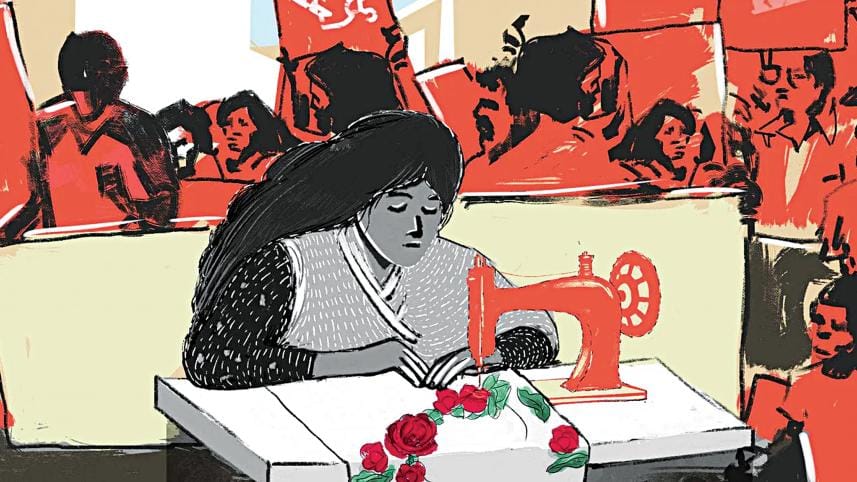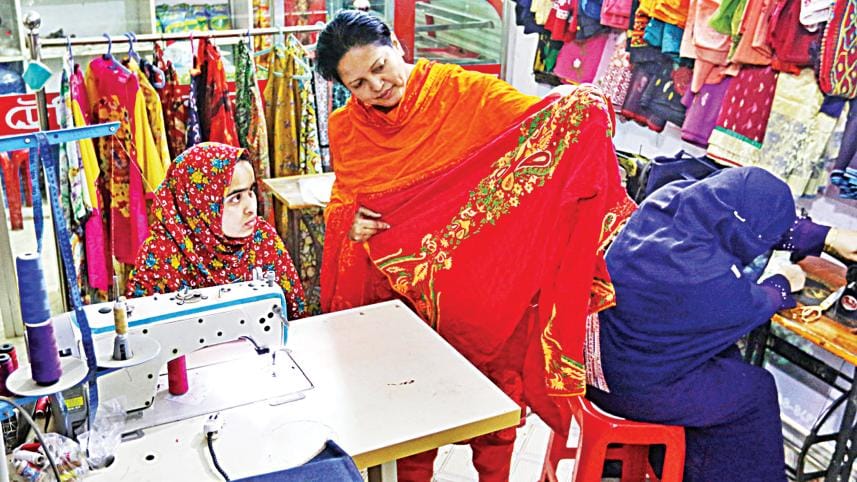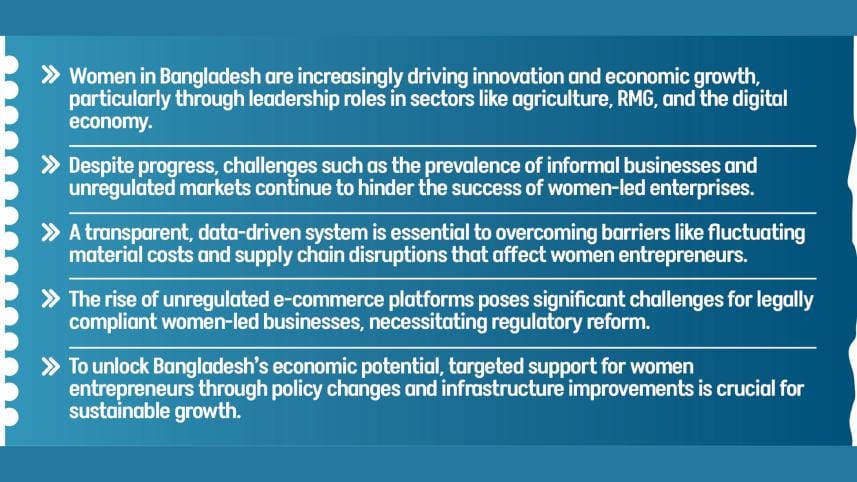Why women must be empowered

Bangladesh, with its population of 170 million, holds immense potential for women to drive innovation, productivity, and economic growth. As almost 50 percent of the population comprises women, their active participation in various sectors can significantly shape the nation's future trajectory. Recent data from the Bangladesh Bureau of Statistics reveals a notable rise in female-led households, reflecting the increasing leadership role women are taking in society. This shift highlights their potential as key contributors to sustainable economic development.
Women in Bangladesh are making significant strides in leadership across a wide range of sectors, including government, non-governmental organisations, and industries. Their influence is expanding beyond traditional roles, with an increasing presence in the economic and business spheres. This progress is particularly evident in the growing number of women entrepreneurs and leaders in key sectors such as the ready-made garment (RMG) industry, agriculture, fisheries, handicrafts, fashion, and the digital economy. From e-commerce platforms to corporate boardrooms, women are not only contributing to but also reshaping the nation's economic landscape. Their active participation highlights the vital role they play in fostering sustainable and inclusive development, positioning women as key drivers of Bangladesh's future growth.
As a woman entrepreneur, I have had the privilege of working alongside many remarkable women who are boldly venturing into diverse SMEs, including handicrafts, e-commerce, food processing, beauty, and tech startups. Together, we have participated in numerous training initiatives organised by business support groups and international NGOs. These programmes have provided invaluable opportunities, ranging from export readiness training and sponsoring international trade participation to practical workshops on how to successfully manage small businesses. Through these initiatives, I have seen firsthand how they bring key stakeholders together, fostering a collaborative approach that drives the growth of women-owned businesses in Bangladesh. The focus on capacity building and the efforts to create inclusive networks have been truly commendable, laying the foundation for the growth of women-led enterprises. However, despite these promising developments, a significant challenge remains—the prevalence of informal businesses in the SME sector. Most local businesses, especially those run by women, operate within the informal economy.

Without formal structures, many women-led businesses in Bangladesh face significant challenges in participating in larger supply chains, both domestically and internationally. Fluctuating costs of material resources, inconsistent supply chains, and unregulated markets are some of the key hurdles. The unpredictable prices of raw materials and irregular availability disrupt production schedules and inflate costs, making it difficult to remain competitive. Additionally, unregulated markets lack transparency, exposing women entrepreneurs to exploitative practices such as overpricing and poor-quality supplies. These challenges limit our ability to secure long-term contracts, fulfil large orders, or scale operations effectively.
A data-driven, transparent, and accountable system is crucial to overcoming these obstacles and establishing structured, women-owned businesses. Reliable data on market trends, raw material pricing, and supply chain dynamics can empower women entrepreneurs to make informed decisions, plan better, and mitigate risks. Transparency in supply chains and marketplaces ensures fair pricing, eliminates exploitative practices, and builds trust between stakeholders. Moreover, an accountable system that monitors and regulates market practices fosters a level playing field, enabling women entrepreneurs to operate competitively and confidently. To truly support women-led businesses, targeted solutions such as collective procurement, building strong supplier relationships, advocating for market regulation, leveraging digital platforms, and introducing supportive government policies must incorporate these principles. By addressing these systemic issues with data-driven and transparent frameworks, women-led businesses can thrive, driving greater economic inclusion and sustainable growth in Bangladesh.

Another alarming trend in Bangladesh is the unchecked growth of unregulated e-commerce and social commerce platforms, where many businesses, including women-led enterprises, operate beyond the reach of government oversight. These businesses often evade tax and VAT obligations, creating an uneven playing field that undermines the sustainability of legally compliant enterprises. This lack of regulation not only facilitates the sale of smuggled goods and unethical procurement practices but also exposes significant gaps in the policy and governance of the e-commerce sector. Additionally, legitimate entrepreneurs face considerable challenges due to the disparity in access to competitively priced imported goods, as they are overburdened by an outdated tariff structure that continues to treat imports as if Bangladesh were a nascent economy.
Despite the country's emergence as an economic powerhouse, excessive duties on essential materials and resources remain a barrier to growth, stifling the ability of businesses to scale in a competitive local or global market. Furthermore, establishing traditional brick-and-mortar stores has become increasingly difficult due to unregulated and exorbitant rent tariffs, forcing many entrepreneurs, particularly women, to opt for selling through e-commerce and social media. Addressing these critical issues requires a holistic approach that includes modernising tax policies, strengthening regulatory frameworks for online businesses, and introducing fair rent controls to foster a more equitable and sustainable business environment.
Women in Bangladesh also face significant cultural and societal barriers that restrict their mobility and independence, deeply rooted in longstanding norms shaped by inadequate security and protection measures. These challenges are particularly pronounced for women in rural areas, where access to reliable and safe transportation is severely limited. In urban centres, overcrowded streets dominated by men have become increasingly hostile environments for women, forcing them to navigate daily challenges ranging from harassment to a lack of gender-sensitive infrastructure. Whether traveling for work, attending meetings, or managing business activities, women are often confronted with safety concerns, societal judgments, and logistical hurdles. The lack of robust law enforcement and government support to mitigate these issues also does not help, perpetuating a cycle of restriction and vulnerability. Addressing these barriers requires systemic reforms, including better public transportation tailored to women's needs, stricter enforcement of laws to ensure safety, and broader cultural shifts to create an environment where women can move freely and participate fully in economic and social life.

At present, we are also facing immense economic challenges due to global conflicts, political instability, and rising inflation, which have significantly impacted consumer purchasing power. In such times, stimulating the economy becomes more critical than ever. The Bangladesh government must take proactive measures to address these pressing issues and implement well-thought-out policies to support local women-owned businesses while empowering consumers. Strategic programmes, stimulus packages, and incentives can be designed to encourage consumers to buy from local businesses. These can include tax breaks, subsidies, or cashback initiatives for purchasing locally produced goods and services. Additionally, promoting awareness of the benefits of supporting local industries—such as job creation, economic resilience, and sustainability—can help foster a culture of local consumption. By bridging the gap between struggling businesses and cautious consumers, these policies can help revitalise the economy, increase buying power, and ensure that local enterprises, especially women-led businesses, continue to thrive despite the challenges. This dual approach benefits both the entrepreneurial ecosystem and the general public, creating a more robust and inclusive economic framework for Bangladesh.
Bangladesh today stands at a crucial juncture, with half of its population under the age of 25, presenting a tremendous opportunity for growth. To capitalise on this youthful demographic, our country must focus on addressing skill gaps by incorporating entrepreneurial education throughout the schooling system, from primary schools to universities. Establishing business and social business clubs and research centres will provide students with hands-on experience, preparing them to meet the evolving demands of the economy. In addition, the government should introduce well-structured grant programmes to support business students and startups, enabling them to develop their ideas and build valuable partnerships. Tailored vocational training programmes aligned with industry-specific needs, along with the creation of research centres at universities focusing on key sectors like e-commerce, green businesses, and the creative industries, will equip the workforce with the skills necessary to drive innovation and growth.

I believe Bangladesh now needs to deliver on its promise of empowerment and inclusivity by creating an environment where women can thrive. This means fostering robust support systems, ensuring access to resources, modernising policies, and addressing the inequalities that hold them back. In the vision of Bangladesh 2.0, young women entrepreneurs are not just participants in economic growth but leaders and changemakers, driving the nation towards sustainable development and global recognition. The future of Bangladesh depends on empowering these women to dream bigger, break barriers, and build a legacy for generations to come.




 For all latest news, follow The Daily Star's Google News channel.
For all latest news, follow The Daily Star's Google News channel.
Comments